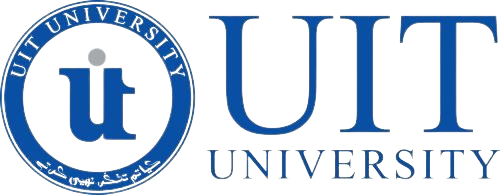Bachelor of Engineering Technology (Computer)
- Home
- Undergraduate Programs
- Bachelor of Engineering Technology (Computer)
Bachelor of Engineering Technology (Computer)
Bachelor of Engineering Technology Programs

Department’s Vision
The department of Engineering Technology fosters innovation and skills to produce top-notch professionals and entrepreneurs who can compete globally and drive positive change in quality of life.
- Overview
- Courses
- Mission, PEOs and PLOs
- Eligibility
Overview
Bachelor of Engineering Technology (Computer) program will prepare professional technologists, i.e., skilled specialists trained to work in computer engineering technology. This is as envisioned by National Technology Council (http://www.ntc-hec.org.pk/index.php) – the relevant accreditation body for engineering technology programs. As per NTC guidelines, the program curriculum incorporates OBE (outcome-based education) model that complies with the Sydney Accord.
Summary
- Technical Courses: 26+Project+ Supervised Industrial Training
- Non-Technical Courses: 14
- Total Courses: 40+Project+ Supervised Industrial Training
- Technical Credit Hours: 94
- Non-Technical Credit Hours: 37
- Total Credit Hours: 131
Semester – I
| Course Code | Course Title | Knowledge Area | Credit Hours | Th | Pr | Total |
|---|---|---|---|---|---|---|
| HST113 | Functional English | Art & Humanities – I | 2 | 0 | 2 | |
| CET112 | Electric Circuits | CET Foundation – I | 2 | 2 | 4 | |
| CET111 | Information and Communication Technologies | Computing – I | 1 | 1 | 2 | |
| NST111 | Applied Physics | Natural Sciences – II | 2 | 1 | 3 | |
| NST112 | Calculus and Analytical Geometry | Natural Sciences – I | 3 | 0 | 3 | |
| HST111/HST112 | Islamic Studies / Ethics | Art & Humanities – I | 2 | 0 | 2 | |
| Total | 16 | |||||
Semester – II
| Course Code | Course Title | Knowledge Area | Credit Hours | Th | Pr | Total |
|---|---|---|---|---|---|---|
| CET121 | Digital Logic Design | CET Foundation – II | 2 | 1 | 3 | |
| CET123 | Computer Programming | Computing – II | 2 | 2 | 4 | |
| NST121 | Linear Algebra | Natural Sciences – III | 3 | 0 | 3 | |
| HST211 | Communication Skills | Art & Humanities – III | 3 | 0 | 3 | |
| HST122 | Pakistan Studies | Art & Humanities – II | 2 | 0 | 2 | |
| CET122 | Electronic Devices and Circuits | CET Foundation – III | 2 | 1 | 3 | |
| Total | 18 | |||||
Semester – III
| Course Code | Course Title | Knowledge Area | Credit Hours | Th | Pr | Total |
|---|---|---|---|---|---|---|
| CET211 | Technical Drawing | CET Foundation – VI | 0 | 1 | 1 | |
| CET215 | Signals and Systems | CET Foundation – V | 2 | 1 | 3 | |
| CET217 | Operating Systems | CET Foundation – IV | 2 | 1 | 3 | |
| CET214 | Data Structures and Algorithms | Computing – III | 1 | 2 | 3 | |
| CET216 | Computer Hardware Systems | CET Foundation – VII | 1 | 1 | 2 | |
| GETxxx | GE-Elective I | Art & Humanities-IV | 3 | 0 | 3 | |
| HST212 | Technical Writing | Art & Humanities-V | 3 | 0 | 3 | |
| Total | 18 | |||||
Semester – IV
| Course Code | Course Title | Knowledge Area | Credit Hours | Th | Pr | Total |
|---|---|---|---|---|---|---|
| CET221 | Instrumentation and Data Acquisition | CET Breadth Core – I | 1 | 1 | 2 | |
| CET222 | Mobile Application Development | CET Breadth Core – II | 1 | 2 | 3 | |
| CET223 | Web Technologies | CET Breadth Core – III | 1 | 2 | 3 | |
| CET224 | Database Applications | CET Breadth Core – IV | 1 | 1 | 2 | |
| CET226 | Embedded Systems | CET Breadth Core – V | 1 | 1 | 2 | |
| HST221 | Technical Writing | Art & Humanities – V | 3 | 0 | 3 | |
| Total | 15 | |||||
Semester – V
| Course Code | Course Title | Knowledge Area | Credit Hours | Th | Pr | Total |
|---|---|---|---|---|---|---|
| CET311 | Systems and Network Administration | CET Breadth Core – V | 1 | 1 | 2 | |
| CET312 | Network Technologies | CET Breadth Core – V | 2 | 1 | 3 | |
| MST312 | Organizational Behavior | Management Science – I | 2 | 0 | 2 | |
| CEDxxx | Depth Elective – I | CET Depth Elective – I | 1 | 1 | 2 | |
| CEDxxx | Depth Elective – II | CET Depth Elective – II | 1 | 2 | 3 | |
| MST311 | Technopreneurship | Management Science – I | 3 | 0 | 3 | |
| Total | 15 | |||||
Semester – VI
| Course Code | Course Title | Knowledge Area | Credit Hours | Th | Pr | Total |
|---|---|---|---|---|---|---|
| CEDxxx | Depth Elective – III | CET Depth Elective – III | 1 | 2 | 3 | |
| CEDxxx | Depth Elective – IV | CET Depth Elective – IV | 2 | 1 | 3 | |
| IDTxxx | IDTE – I | IDTE – I | 2 | 1 | 3 | |
| MST321 | Professional Ethics | Management Science – II | 2 | 0 | 2 | |
| CEDxxx | Depth Elective – V | CET Depth Elective – V | 1 | 2 | 3 | |
| CET321 | Project – I | Senior Design Project | 0 | 3 | 3 | |
| Total | 17 | |||||
Semester – VII
| Course Code | Course Title | Knowledge Area | Credit Hours | Th | Pr | Total |
|---|---|---|---|---|---|---|
| CET412 | Cloud Computing | CET Breadth Core – VII | 1 | 2 | 3 | |
| IDTxxx | IDTE – II | IDTE – II | 2 | 1 | 3 | |
| CET411 | Project – II | Senior Design Project | 0 | 3 | 3 | |
| GETxxx | GE – University – II | University Elective – II | 3 | 0 | 3 | |
| CEDxxx | Depth Elective – VI | CET Depth Elective – VI | 2 | 2 | 4 | |
| Total | 16 | |||||
Semester – VIII
| Course Code | Course Title | Knowledge Area | Credit Hours | Th | Pr | Total |
|---|---|---|---|---|---|---|
| CT421 | 16 Weeks Supervised Industrial / Field Training (SIT) (8×5=40Hrs / Week) | Computer Engineering Technology Domain Industrial Training | 0 | 16 | 16 | |
| Total | 16 | |||||
Program Mission
Provide the ambience to become industry ready Professionals and Entrepreneurs by offering curriculum based on cutting edge technology and experiential learning.
Program Educational Objectives
The Engineering Technology department trains graduates to be successful engineering technologists who use their knowledge and skills to develop innovative solutions for industry, government, academia, and society.
The main objectives that our graduates are expected to achieve in the long run are:
Will have demonstrated knowledge of relevant Engineering Technology appropriate for career pursuits and workplace needs.
Will have the ability to understand, diagnose, communicate and provide solutions to technical problems/situations for the benefit of the society.
Will demonstrate the intellectual curiosity to actively pursue the acquisition of new knowledge and skills necessary to refine and improve his/her abilities to contribute to the Technology domain.
Ethical commitment that allows them to deal successfully with social, technical and professional situations in their lives and work.
Program Learning Outcomes
- Engineering Technology Knowledge (SA1): An ability to apply knowledge of mathematics, natural science, Engineering Technology fundamentals, and Engineering Technology specialization to defined and applied Engineering Technology procedures, processes, systems, or methodologies.
- Problem Analysis (SA2): An ability to Identify, formulate, research literature, and analyze broadly defined Engineering Technology problems reaching substantiated conclusions using analytical tools appropriate to the discipline or area of specialization.
- Design/Development of Solutions (SA3): An ability to design solutions for broadly- defined Engineering Technology problems and contribute to the design of systems, components or processes to meet specified needs with appropriate consideration for public health and safety, cultural, societal, and environmental considerations.
- Investigation (SA4): An ability to conduct investigations of broadly-defined problems; locate, search and select relevant data from codes, databases, and literature; and design and conduct experiments to provide valid conclusions.
- Modern Tool Usage (SA5): An ability to Select and apply appropriate techniques, resources, and modern technology and IT tools, including prediction and modeling, to broadly-defined Engineering Technology problems, with an understanding of the limitations.
- The Engineering Technologist and Society (SA6): An ability to demonstrate understanding of the societal, health, safety, legal and cultural issues and the consequent responsibilities relevant to Engineering Technology practice and solutions to broadly defined Engineering Technology problems.
- Environment and Sustainability (SA7): An ability to understand and evaluate the sustainability and impact of Engineering Technology work in the solution of broadly defined Engineering Technology problems in societal and environmental contexts.
- Ethics (SA8): Understand and commit to professional ethics and responsibilities, and norms of Engineering Technology practice.
- Individual and Team Work (SA9): An ability to Function effectively as an individual and as a member or leader in diverse teams.
- Communication (SA10): An ability to communicate effectively on broadly defined Engineering Technology activities with the Engineering Technologist community and with society at large by being able to comprehend and write effective reports and design documentation, make effective presentations, and give and receive clear instructions.
- Project Management (SA11): An ability to demonstrate knowledge and understanding of Engineering Technology management principles and apply these to one’s work as a member or leader in a team and to manage projects in multidisciplinary environments.
- Lifelong Learning (SA12): An ability to recognize the need for and have the ability to engage in independent and lifelong learning in specialist Engineering Technologies.
Candidates applying for this program must have passed higher Secondary School Certificate Examination (HSSC) II exam in Pre-Engineering or any equivalent qualification including DAE / A-level / ICS with at least 50% or 550 out of 1100 marks are eligible to apply for admission.
Pre Entry Admission Test
Candidates are required to:
pass the pre-admission entry test of the university,
pass UIT’s test in the last two years,
pass HEC’s Undergraduate Studies Admission Test (USAT) with 50% marks, or
score at least 800/1200 in SAT-I and secured at least 650/800 in SATII with subjects of Physics, Chemistry and Mathematics.
